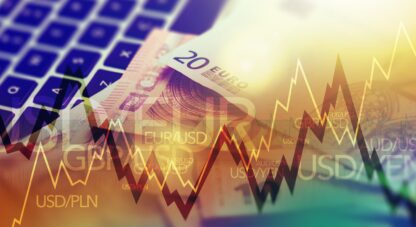The McAlvany Weekly Commentary
with David McAlvany and Kevin Orrick
Kevin: David, today you are in New York, I know you have the CNBC interview tonight on CNBC Asia at 6:40 pm Eastern time. What are you going to be talking about?
David: Kevin, it is appropriate that we are talking about commodities, particularly since Asia and China, specifically, are the main drivers of a lot of the commodities. Looking at commodity pricing over the last 6-8 months, we have seen not only a trailing off, or a decline, in Asian equity prices, but also in a lot of the commodity prices, be that industrial commodities, or even some of the agriculturals. I think there is a trend, and it speaks to an economy, both in Asia, in Europe, and in the United States, which is not, in fact, in recovery, although that is what we are being told to believe, and to hope for.
Kevin: David, I would imagine you are going to make the distinction between commodities and money, in this case being gold, because the Chinese and the Indians have been buying gold with both hands, at records amounts, while the commodity prices on the other commodities have been falling. Maybe you will have a chance to make that distinction, as well.
David: Yes, clearly, there is a different market. I did an earlier interview with a group here that deals with hard assets, fairly bullish on the commodities phase, altogether, but we were pretty much in agreement that gold is the standout, because it is in a low real rate of return environment the place where people go, and particularly as we move into 2012.
When we look back at 2012 I think we will see it as a transition year between what was a European crisis, and what is becoming a U.S. crisis. But there is this significant component in terms of the global economy, which is Asia, and specifically, China, and the contribution that everyone is hoping that China will make to the global economy, as we pull ourselves out of the malaise and get back on its former growth trajectory. That is not, in fact, what we think will happen, but 2012 will, in essence, be that transition.
Kevin: David, it is an understatement to say that this last 4-5 years has been fascinating in the scheme of things, after looking at the last two-and-a-half or three decades of debt growth, it was unstoppable until about 2007-2008. I saw the cover of The Economist a couple of weeks ago. It had a little cartoon that said, “Recovery at last?” And these guys said, “Yeah, after five years?”
We have been hearing about recovery. Initially, it was going to be the Federal Reserve and all the money that they were infusing, and then after that, we looked toward Asia and their growth, maybe Asia was going to pull everybody out – we need to have somebody.
But the new talk right now David – we all have iPhones, iPads, laptops that are from Apple – the world seems to be going iEverything, for Apple. Apple has a hundred billion dollars in cash. We are starting to see commentators at this point saying, “Well, if it’s not the Fed, and if it’s not Asia, maybe it’s going to be the corporations who have a tremendous amount of cash, just sitting in reserve right now. They are not spending it.
David: Perhaps, symbolically, we could call this the iRecovery. (laughter) Apple, with a hundred billion in cash, and not only will they likely be the first trillion dollar company, or at least, so we are told.
Kevin: Wait a second, David. There were other trillion dollar, or deutschmark, countries in the past. We certainly saw one in the Weimar Republic, or we saw many of them as the currency collapsed.
David: And more recently, in Hungary, more recently in Zimbabwe, so you are right, we have had trillion dollar companies before, but it is going to take a cash hoard far larger than a hundred billion in cash to get us on recovery. Nevertheless, the pundits would have us believe that recovery is nigh. All we need to do is incentivize companies to spend, spend, spend. Will that be the catalyst?
Kevin: David, right now these companies are sitting on cash for some unknown reason, because we know that cash is devaluing on an annual basis, by at least 2-3%, according to what the government tells us, but we know that inflation is higher than that, so obviously, there is some reason that they are willing to give up that opportunity cost. You have been skeptical about these companies coming in and just blasting the economy with a bunch of new capital. What causes that skepticism, David, and why are they sitting on it still?
David: We have seen growing cash on the balance sheets, since around 2000-2001, so it has failed to materialize up to this point. But you are right, we do remain skeptical. I think as corporate chiefs are making some key decisions as to how to invest and anticipate the future, they are looking ahead and they are seeing both tax and regulatory uncertainty. You have to know that both tax uncertainty and regulatory uncertainty are major components for them as they are trying to figure out how, when, and where, to invest – even if, under a future Obama administration, taxes go down. That is what he has suggested for manufacturers, at least.
For individuals, we have the Bush-era tax cuts, which will be sunsetting. This is consumers facing higher levels of taxes which, of course, is going to decrease their ability to spend and make a larger contribution to the economy. Corporations have to take that into account, as well, the hamstringing, if you will, of individual investors as they deal with a higher tax burden.
Kevin: We also have this massive legislation that has been coming through. We have Dodd-Frank, we have FATCA, we have these capital controls that are coming on. If you are a company, and you are trying to figure out how to invest your money and you have no idea whether the government is going to be confiscating something that you are doing down the road. It reminds me of the Napier interview last week. The government will get paid, one way or another, and you are going to be doing the paying.
David: Kevin, we have looked at 1933 to 1940 as a period where, with massive, in fact, draconian, legislation being put in place, 40 monumental pieces of legislation, and there was cautious spending from private investors. In fact, private direct investment all but disappeared in that period, and not only was there market volatility, but there was a response to the confiscatory nature and an actual perceived threat to private property, given all of these pieces of legislation. This idea of regulatory and tax uncertainty touches a similar nerve. It touches this nerve of private property rights. These are issues which, if left unresolved, keep capital on the sidelines.
Kevin: David, isn’t it an illusion anyway, when we talk about corporations, or you hear on financial TV that these corporations have all this money that they just can’t wait to spend? They are just not doing it quite yet. It is a historical allusion that that could actually happen. One of the worst periods that we have had in the last century in the stock market was actually a period of time when the corporations had quite a bit of cash, wasn’t it?
David: It’s not so much that it could not happen, it’s that the impact is meaningless. It is insignificant. The last period of time when corporate liquid assets reached these levels, relative to total assets, which is about 6½% to 7% of their balance sheets, was 1963. In spite of spending those cash assets in a massive reduction relative to total assets, equity prices did not move considerably. We went into a bear market, so corporations were spending through their cash hoard, and that did not prevent us from going into a structural bear market circa 1966, and we didn’t come out of it for another 19 years, at least from the 1963 period.
In fact, we didn’t see a real recovery begin in equities until 1982, so the argument simply does not hold. Companies spending their cash hoard is not on a scale large enough to be the primary driver of a secular bull market in equities. We are talking about something much more fundamental, something like a shift in the credit markets. In fact, what we have now is a shift in the credit markets, in the wrong direction.
Kevin: The thing that is also interesting is that period of time that you are talking about, the early 1960s all the way through the early 1980s was a period of time when the stock market did relatively nothing, as you said. But if you were holding an ounce of gold, it actually outperformed the stock market 30-fold, and so, there were profits to be made during the period of time when the corporations were sitting on large amounts of cash and the equities markets weren’t moving. But they certainly were not in equities.
David: I think it is really important to look at that period, because it resembles, quite remarkably, this period of time right now – 1966 to 1982 – that period, and the period of time that we are in now, the stock market didn’t crash, we weren’t talking about it getting cut in half, or down by two-thirds, à la the Great Depression 1929 crash, where it was actually down 89% at its worst. It just moved sideways. It didn’t move anywhere for many, many years, in fact, nearly two decades, and in that period of time, inflation went from being on no one’s radar in 1966, to on everyone’s radar by 1982, and that got fully priced in to asset classes, with equities getting crucified and gold and silver doing very, very well on an accelerated basis as time went on.
We are in a similar period of time, a period of low real rates of return, where you are factoring in taxes, which we were talking about earlier, and inflation, which we regularly comment on. These factors take away from your real rate of return, what you get to take home, and that is the perfect environment for investors who want to move capital out of the stock market, out of the bond market, into – and there is the big question mark hanging over them – what do they put it into? Is it Treasuries? Is it euros? Is it Australian dollars? Is it Canadian dollars?
This is where many investors, not all, but many, conclude they don’t want to take the currency risk, they don’t want to fool with other fools – not just our Fed, and not just the ECB, but any other central bank that is determining the course for any foreign currency. Just keep it simple. Follow the KISS principle and move to metals. That has been the classic move in a period of low real rates of return – into gold, specifically.
Kevin: David, if we were to go back in a time machine to the early 1980s, back to the Reagan years, what we were seeing at that time was the very beginning of a credit boom. Interest rates were about to start to come down and fuel a credit boom for the next 30-31 years. We are to the point now where we can’t go much lower, obviously, so where is this credit boom going to come from?
David: That is the absurd thing about where we are today, because we have record low rates, not record high rates. We are at the opposite end of the spectrum. Credit can’t do anything, but as our guest last week suggested, from here it can die, but there is no recovery in the credit market. There is no place for interest rates to go but up. What kind of a time frame it does it in, we don’t know.
Look at corporate executives today, and back to the issue of their cash hoards, our point is that they have a motive to hold onto their cash and build a war chest. If we can reflect on the value extraction, if you will, taking place by executives as they liquidate stock, their own stock, their own company stock, aggressively, into this last rally, this is not when those same managers would be going out to pay high prices for assets for the companies that they manage.
Do you see what I am saying? There is this notion that we want to better our own balance sheet by getting liquid and staying liquid, and taking advantage of these high prices. It is the exact opposite of those companies using that cash war chest to go out and buy, via mergers and acquisitions, assets which are equally priced relatively high.
Kevin: So David, you are saying we need a credit boom, if interest rates right now were like they were in the early 1980s. I remember my wife and I got a mortgage on our first house after we got married, and the interest was in the double-digits, so we were seeing high interest rates, and most of our married life, we have seen interest rates coming down to this level. We need a credit boom.
David: We need a credit boom if we want a secular move. By secular, we mean long-term – a years to decades kind of a move. We may have a cyclical upturn in the equity markets, but nothing that is sustainable beyond months – not measured in years and decades. The secular moves, the big picture moves, are driven by the credit markets, and if credit is expanding, guess what happens? You see a massive boom, economy-wide. If credit is contracting, you see a massive bust, economy-wide.
That is, in fact, what the Fed has been fighting, this de-leveraging, this deflation, if you will, within the credit markets. That is a concern which still has to be played out. As we have noted, deflation is one thing that does hit commodities very hard, gold being an exception. If you look at the purchasing power of gold over the last 350-400 years, spanning both British and American history, where gold played a significant measure, and we have to go back that far if we are going to be looking at gold and how it behaved in a deflation, it did very well – minimum 30-45% increase in purchasing power, maximum 250% increase in purchasing power, in the context of a deflation, in the context of system-wide deleveraging.
I think, Kevin, the equity markets have to run their natural course, and they have become, at this stage, anyway, over-dependent on fresh promises of fiat money coming from the Fed and ECB, other short-term fixes that the central banks of the world have offered. The markets have not run their natural course, and they still need to.
Kevin: David, this is a time to perhaps look at where that cash is anyway. We know that companies have been re-hiring employees. Some of these companies, like Apple, are expanding, but they are hiring people in foreign countries. As far as the U.S. employment numbers, that is not very helpful.
But the other thing that we need to look at is, where is this cash? We talk about almost a hundred billion dollars that Apple has, and Microsoft about half of that, and Cisco Systems. These companies do have a lot of cash, and we, as Americans, have a tendency sometimes to look through a monoscope. We just look at America and we say, “Why isn’t that cash going into U.S. equities?”
You had mentioned gold doing well during a deflation. Are these companies just holding cash elsewhere to hedge against the dollar? Is it a currency play?
David: There are a couple of things. As you mentioned, they are rehiring, and the rehiring is happening on a more global basis. We have seen some changes in China, with an increase in labor wages there, and a diminished advantage for that sort of labor wage, arbitrage, if you will, where you manufacture and produce in different locales that have a lower input cost into the products that you are producing, which gives you a wider margin and larger profits.
But that is being squeezed a bit. The new hiring for U.S. corporations, much of it is still in low wage zones throughout the world. You are also right, Kevin, to look at these cash balances and see that out of the roughly 1.9 trillion dollars in cash, I have seen estimates as high as 3.7, but I have never been able to confirm that, but out of a minimum of 1.9 trillion dollars in cash, 700 billion of that is sitting in other parts of the world. It is overseas. Of Apple’s 100 billion, almost 70% of it is overseas. Of Microsoft’s 52 billion, 89% of their cash is sitting overseas.
Kevin: So Microsoft is almost completely international at this point. 89% of their cash is overseas. Why are we even considering that an American boon to the economy?
David: Again, Cisco, Google, Oracle, QualComm, Amgen – these are companies that carry anywhere from 48% to close to 90% of their cash overseas. There are a couple of reasons they would do that. From a tax standpoint, there is also the issue of perhaps they are embedding a currency hedge, if you will, into their own balance sheet. The point on taxes is simply this: They don’t get to avoid the taxes, it is just that as long as they are retaining the earnings in their foreign subsidiaries, they are not paying taxes on that income.
It is when the earnings are paid out to their company, or distributions are made, repatriated so to say, that it becomes a tax issue. They have a motive to hold cash overseas, partially on a tax-deferral basis, but also because they have a growth model which implies the rest of the world, frankly, is more important than the domestic economy, from this point forward.
Kevin: Our interview with Russell Napier last week was very sobering. One of the things he was stressing to the people who were listening was that if you want to hold onto your assets, you are going to have to have some assets overseas. I think what we are seeing at this point is that corporations are making that natural transition just for survival. Russell Napier was advising that corporations take that same advice.
David: Kevin, I did an interview with Bloomberg in the first quarter of this year for the print media, and the conversation revolved around currency hedging, and currency trading, and how these multi-national corporations used to just sell widgets. They occasionally would have commodity hedging or trade desks, in which because they have these massive input costs, whether it is a particular commodity, like oil, or nickel, or aluminum, or what have you, they would try to hedge their bets, so to say, and not have the impact of price volatility in that commodity impact their earnings.
Now, with international operations generating in some cases the majority of their revenues overseas, these corporations are having to retool and develop their own currency trade desks. It is becoming a necessary, needed phenomenon, to diminish the exchange rate volatility for their earnings.
Kevin: David, your family has always looked at adversity and said, “Where’s the opportunity? How do we survive this?” Your dad was like that, and you are like that. We have read the book, When Money Dies, and we have looked at the Weimar Republic as the currency completely fell apart, and we think, “Oh my gosh, everybody must have just been devastated.” But one of your favorite characters in history, a guy named Hugo Stinnes, actually became fabulously wealthy during that period of time using this same strategy. Isn’t it about the same strategy that we are seeing?
David: Kevin, it is fascinating, because it could be that foreign currency revenues from many of our current-day corporations are the means by which they outlive their states. In other words, a multi-national corporation with its headquarters in the United States that is generating 20, 30, 40, 50% of its revenues in foreign currency terms – that may the means by which it is actually a healthy, viable, going concern, long after the extinction event takes place, either for the domestic currency, or a bankruptcy event within that country.
Hugo Stinnes is a case in point. He ventured into a very risky investment. He bought a steam engine in Great Britain for 3500 pounds, and used the steam engine to carry coal from Germany, his home country, into France, where he developed this foreign currency revenue stream. As the German mark was imploding, and equity values were collapsing along with the currency, only on a slightly slower basis, he was able to take his French franc revenue, and ended up buying close to 2500 companies in his domestic German economy.
When I look at what we see in terms of balance sheet exposure, the cash portion that is developing in these multi-national corporations, there is a ring from history, an echo from history. Cash flows from outside of an economic conflict zone, if you will, are very interesting.
Kevin: I am going to shift gears here, because we have been talking about equities, and I think there are certain things that a person can look at with equities, if they choose to look outside of their country, that are telling signs. I will give you an example – the emerging markets. They peaked out about a year ago. What does that tell us? Is that a vital sign, or is that something like taking a pulse, where we can say that there has been a change, and how does that affect the U.S. market?
David: Yes, clearly, the emerging markets, having peaked a year ago, is a little bit of a canary in the coal mine, where the direct supply of artificial stimulus was less and we have had more supply into Western economies of Europe and the United States. The developed markets are now beginning to sputter as quantitative easing and other forms of stimulus have had their effects. They have run their course, and they are now through the system, or simply not making their way into the system. Investors continue to wait and see if a fresh round of artificial stimulus is coming.
As we recorded 2-3 weeks ago on the Commentary, insider selling has been, and continues to be, at near record levels. In other words, the corporate executives, CFOs, CEOs, COOs, CIOs, believe that the Dow 13,000 is priced high – high enough, that is; that the S&P 1400 is a good price – good enough, that is, to be selling at.
Kevin: Sure, and these would be the guys who would know, the guys who are running the corporations. But do you think, also, that this insider selling comes because the global equity markets are starting to factor in the reality of a Chinese slowdown? We have talked about a slowdown in China. It seems like the numbers are coming in. Are the stock markets preemptively reflecting something more?
David: If it is not that, it is at least investors on a wait-and-see course, until key leadership roles are determined, and a clear political, and thus economic, path is chosen in China. Taiwan, Australia, South Korea, Hong Kong – all of these equity markets have failed to see new highs, and actually, over the last 12-36 months have been in decline.
The one standout would be the Philippine index, and that is a nod to my dad. He spends a lot of time in the Philippines. It’s the only Asian standout. Everyone else, and particularly those who have very high trade with China, is in decline. Australia is a major canary. We watched the press from BHP with great interest a number of months ago as they basically said their orders for iron ore from China were in steep decline. If you are looking for canaries in the coal mine, we have plenty of them.
Kevin: What you are talking about is the economically sensitive stocks – machinery, materials, or those companies that produce types of things, actually are not making new highs at this point. They are stagnating or falling.
David: Exactly, and if you look at some of the chart patterns, whether it is for BHP or Freeport-McMoRan, these are companies that are very, very primed for economic growth, and when you don’t have that economic growth, there is also some real vulnerability.
So the real vote of confidence in the return to growth and prosperity – that story – we’re not seeing it. We anticipate that that story will ultimately prevail, but not without the pipes getting cleaned out, and that is what we are talking about in a de-leveraging process. The pipes get to get cleaned out. Corporations that have bad debts – that debt goes away. Banks that have bad debts – that debt goes away. We are talking about failures, unfortunately. There is a real human cost to that, and we don’t take that lightly, by any means.
This was the big deal in 2010 and 2011. It was sovereigns, which for the first time, were fiscally challenged, and countries were hanging on by a thread. Their equity markets still reflect that. If you look at that in Europe, Germany is the only one where you can see some sort of a recovery story showing up in their equity markets. If you are looking at France, or Italy, or Spain, or Greece, the best you have in those equity markets, is a dead cat bounce.
Kevin: What we are talking about are real companies that produce real things, like machines, materials, that type of thing. But there is a portion of the market that is built on paper. It is almost like a drug addict. Of course, I’m speaking of the financials, the guys who are waiting for the next bailout dollar. They heard about QE-I and they said, “Well, of course, we had to do it.” They heard about QE-II and they said, “Well, of course, we have to do it, it is going to create a recovery.” It did not. But the talk right now is that the financials are just waiting for their next injection, called QE-III, or maybe it will be like a generic drug over the counter that isn’t called QE-III, but it will be same thing. So they are going to rise and fall, aren’t they, with stimulus from the government?
David: That is true. Just as we talked about the economically sensitive stocks, and being highly geared to a growth thematic, the financials are highly geared toward a cheap-money thematic – cheap money from the Fed. So it is a lot like a drug dependency, if you will. Unfortunately, many asset managers have begun to recalibrate expectations and view the financial sector as now undervalued, looking at Bank of America as a reasonable play from $8 on the share, to $12, in their opinion.
Of course, as a rate of return, a good 50%, they would consider that potential, on the current price, to be “undervalued.” The better question, in my opinion, is to ask, “Why are the financials – why are the brokers, why are the insurance companies – not doing better in light of record stimulus received? We are talking about monumental sums of money. In fact, in world history, we haven’t had this kind of money thrown at the markets, in terms of a reviving process, and yet we can barely even get Bank of America off the floor. It sold at $45 a share in 2008. It still remains under $9.
Kevin: Yes, Dave, the fall has been resounding, $45 a share, down to $9, and now these guys are saying that means it is undervalued, but there is a reason. It is like what we talked about before, there is a reason these corporations have all this cash and are not spending it. There is a reason also why these financials who have been infused with massive amounts of money – the only guys who really were bailed out in the bailout were the bankers – yet their share price is still $9 in comparison to $45 after all this time.
David: Kevin, I think they moved from $3 to $9 on the basis of creative accounting and those stimulus efforts, but you don’t go from $9 to $45 again unless you have something fundamental backing you, and that is a credit cycle which is supportive to growth in the economy, lending going to levels that we saw in 2007 and 2008, and the decade, or even two decades, before that. That is only going to happen if you have structural support.
We don’t have structural support. We have stimulative support directly from the Fed, and even with that, they are not willing to take their excess reserves and throw them at the economy, lend them out into the larger economy, and create credit. That was one of the key points made by Russell Napier last week, that in his view, we have the death of credit right in front of us. We talk about the death of the dollar, but we have the death of credit right in front of us, because banks are not doing their jobs, which is to take that capital and lend it out to small businesses and individuals, who then grow the economy organically. It’s not happening.
There is a step which is missing in the sequence, which many investors on Wall Street assume is there. Liquidity created equals growth in the economy. The problem is, the step that they are filling in the gap, is that the banks which gets that liquidity are supposed to lend it into the economy, and that, in fact, is not happening. There is no lending. The mechanism is still broken. It has been broken since 2008.
Kevin: The question would be, what are the Fed and the ECB hoping for? They continue to print money, hand it over to the banks, it doesn’t go anywhere, and the share prices aren’t recovering, not only for the rest of the economy, but even in the banks. So what is the hope, as they continue to stimulate, or are we going to see a reversal in policy?
David: It is difficult to say what exactly has been intended, but we do see a massive consolidation of power in the banks, and we have talked about this in the past, where the major banks have grown in terms of assets under management. The scope, the scale, the size of these businesses, is even larger. These too-big-to-fail organizations have grown even bigger in the last 3-4 years. I don’t know if that was the intended course that the Federal Reserve had for the commercial banks, but that has been, and remains, a benefit to the banking community, not necessarily to the larger economy, or the economy at large, but the banking community has gotten larger in this context.
Kevin: I am sitting here thinking about a metaphor for this, because this has been a strange year. We keep seeing this leviathan of government grow, and it is going to be growing quite a bit more. If you want to use that same word, there is a leviathan of excess money that just keeps being put into the system. It reminds me of a film clip I saw one time of these guys who were trying to move a dead whale off of the beach. They tried a number of different things. They brought in heavy machinery and it wouldn’t move. They tried a bunch of things, and finally somebody just stuffed it full of dynamite.
David: (laughter) I was just going to say, the only way to get to rid of it…
Kevin: Well, the problem was they put too much in, and it blew it to where the camera crew and everybody else was getting showered with fragments of whale.
David: Oh, blubber.
Kevin: (laughter) But I’m thinking, all right, if you are the Federal Reserve, you’re trying to get something going, and it ain’t happening. What do you do? If you’re Bernanke, yeah, okay, so you print a little bit more money, maybe get Obama re-elected, take the pain away for just a little while longer. If you’re a corporation, you’re sitting on all this cash, but you’re not looking at growth, so you are thinking, “How do we move the whale?” I don’t know if that’s a good analogy or not.
David: Well, unfortunately, we don’t have the dynamite option, but I think we can anticipate something that is very critical. As we look at these cash balances on corporate balance sheets, as we talked about earlier, the developing economic conflict zones, there are companies doing something smart – adapting and changing, and keeping their cash flows, and continuing to build their cash flows outside of the economic conflict zone. What am I talking about? That is any area of the world where the battle lines are being drawn between private capital development, on the one hand, and public capital need, on the other – where there is this conflict and competition for limited resources.
If I can just go back to a critical element of our conversation last week, the sobering conclusion from the conversation with Mr. Napier is that wherever you are in the world, if your government will have to take your wealth to fill the fiscal gap, you should remove your capital from that country. This is something that has been a theme, in theoretical terms, for us for decades. This is something that Don has harped on going back to when I was probably six years old, which was, yes, decades ago. This is the amazing thing. Some people listen and some people don’t. But theoretically, it was a risk. Governments come into tough times and they get very grabby, so make sure that you don’t have all of your eggs in one geographic basket.
That was in theory. Now we have governments that are getting grabby. It is no longer theoretical. What are your choices? It is very clear what investors need to do. They need to move from theory to practice. Quit theorizing, quit thinking about what could happen to them, and instead, look at what is likely to happen to them, in this period where the battle lines are being drawn between private capital and public capital needs. I think this is where we need to look very seriously as what our options are.
Kevin: David, that is exactly right. You have recommended for years, and Don has recommended for years, having some assets overseas. Of course, it has never been for secret reasons. It is not a secret type of play, it is something that is fully reportable, fully legal, but it is outside of the country. That was Russell Napier’s point last week. He was saying that if you think that government is going to go bankrupt before you do, you are mistaken. The government is going to get what they need to get to continue to survive, and that could be through capital controls, it could be through taxation. It could be through a number of things. In fact, he was saying that it could be quite subtle, in the form of financial repression, in which you are just not getting a real rate of return and wondering why you can’t come up with the amount of money that you need to get to the end of the month.
David: Kevin, our skepticism, frankly, doesn’t have national boundary markers. We are not really criticizing the U.S. government in this regard. We are saying that if you live in Mexico, you should have a part of your assets in the United States, or better yet, in Canada, or better yet, just anywhere else. If you are a U.S. citizen, you should have some of your assets in Canada, in Switzerland, in Singapore. If you are a Swiss citizen, you should have a part of your assets in Italy, Spain, England, someplace else, some geographically different location. If you live in India, you might want to have some of your assets in Singapore. You might want to have some of your assets in Switzerland. If you live in China, you may want to have some of your assets in Hong Kong, although that may not be far enough.
The point is to have a realistic appraisal of your government, whatever that government is, and take the steps necessary to have seed capital for the future, whether that is to build an enterprise, to build a business, or to just restart. This has been the tradition of the wealthy, old European families. The smartest ones were the ones who took a part of their wealth and diversified into another country, built a new business there, built a new franchise, or simply just relocated assets.
Kevin: Of course, one of the great risks throughout history of having money elsewhere is the currency risk. If you had it in Germany, or Switzerland, or like you said, Singapore, or China, or what have you, a lot of times people will actually go out and just put it in that currency, but they are actually just taking a long-term bet that that currency is going to be better than the dollar or whatever currency they are coming out of.
But historically, the people who stored gold overseas have found that that takes out the currency risk. Gold has a consistent buying power in all currencies, and even though it fluctuates in the value of those currencies, it still buys about the same amount of goods and services, so wouldn’t you say again, Dave, just to restate, that a little bit of gold elsewhere sure doesn’t hurt?
David: Kevin, I think it is vital. As we come into 2013-2014, if 2012 is, in fact, the transition year we described it as earlier, it is important for people to get their ducks in a row now. Remain compliant, remain reportable, do everything that you can to be aboveboard in your business decisions and business handlings, but I would consider Switzerland, I would consider Toronto. We are launching a program in Toronto within weeks, to be followed by Singapore, as an option for physical gold storage.
It just depends on who you are, where you live, what options you need, but Switzerland, Singapore, Toronto, Canada, whether you can drive there, fly there, take a boat there – just have something somewhere else. It comes down to the basic concept of the battle lines being drawn. You may never have thought of where you lived as being an economic conflict zone, but the conflict is not a physical, military conflict. The economic conflict zone we are talking about is the strategic competition between private capital and public capital needs, and as we discussed last week, if it is within the power of government to extract what they need to remain alive, the leviathan will do just that.















